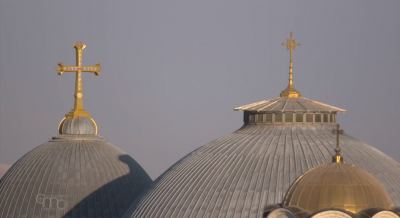In recent years, the shrines in the Holy Land have received millions of pilgrims from all over the world. Mystical places where the grace of Revelation is experienced.
During this 2020, because of the Coronavirus, the sanctuaries of the Holy Land also had to face drastic changes: from the multitude of pilgrims to empty sanctuaries.
The Custody of the Holy Land has the task of guarding 80 sanctuaries, from the largest to the least known, located on the current borders of Israel, Palestine, Jordan and Syria.
From Mount Nebo, where Moses contemplated the Promised Land…
…to the sanctuaries of Jesus’ life, passion and death.
Jerusalem is considered the heart of the Holy Land.
On the Mount of Olives, the Sanctuaries of the Passion: Jesus’ weeping and lamenting over Jerusalem are commemorated in the Church of Dominus Flevit , which offers one of the most beautiful views of the Holy City.
A few meters below, next to the garden of olive trees, is the Basilica of Gethsemane, the place of Jesus’ agony.
Early in the morning Br. Benito opens the doors to receive the hundreds of pilgrims.
Br BENITO JOSÉ CHOQUE, ofm
Guardian of the Basilica of Agony
“We Franciscans of the Custody of the Holy Land conserve with much love these eight olive trees planted in memory of the Lord’s agony.”
Inside the Walls of Jerusalem, pilgrims follow the 14th Stations of the Cross. A practice begun by the Franciscans in 1600 and repeated every Friday until today.
For Christians, Jerusalem has a heart: the Basilica of the Holy Sepulchre, where the Calvary and the Tomb of Christ are located.
The opening of the Basilica takes place very early at 4 a.m.: the three communities open its large doors together. Day and night, they take turns celebrating in different parts of the church and in common areas such as the tomb and Calvary. The Holy Masses begin at 4.30 a.m. followed by the celebrations for pilgrims in the different chapels.
Br SALVADOR ROSAS FLORES, ofm
President Holy Sepulchre Convent
“Hope has always accompanied us, even though the door was closed, the hope of opening it, of receiving Christians again, of showing the holy places, even of bringing them inside ourselves. This hope remains among us, among us friars, among Christians.
We must be cautious, of course, because the Lord recommends it to us. Hope must be enriched through time.”
The Franciscan presence in the Holy Land dates back to 1217, with the arrival of the first Franciscans: a presence confirmed through documents issued by the popes over the centuries.
“This land is loved and desired by many. All of us are called to guard it, protect it and feel it ours. It is at the origin of our culture, history, religion… For this we need the support of all!”.
Br Francesco Patton, ofm
Custos of The Holy Land
On September 13th
Help the Holy Places with your contribution!
Support the Christian presence in the Holy Land.
Source: custodia.org






